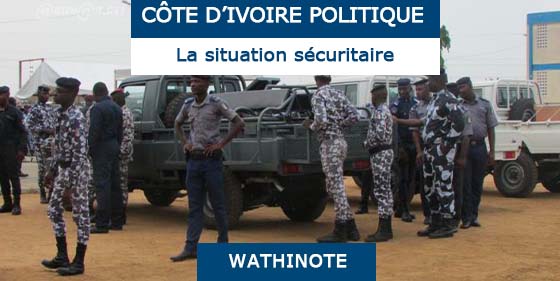Author : William Assanvo
Affiliated organization : Institute of Security Studies Africa
Site of publication : issafrica.org
Type of publication : Article
Date of publication : 15, June 2021
*Les Wathinotes sont des extraits de publications choisies par WATHI et conformes aux documents originaux. Les rapports utilisés pour l’élaboration des Wathinotes sont sélectionnés par WATHI compte tenu de leur pertinence par rapport au contexte du pays. Toutes les Wathinotes renvoient aux publications originales et intégrales qui ne sont pas hébergées par le site de WATHI, et sont destinées à promouvoir la lecture de ces documents, fruit du travail de recherche d’universitaires et d’experts.
Several attacks in Côte d’Ivoire along the border with Burkina Faso claimed the lives of six Ivorian soldiers in the past three months. Five others were injured. These incidents have heightened fears of violent extremism spreading in the country.
These incidents aren’t exhaustive and probably reflect the worst manifestations of the threat. And although the number of attacks to date is relatively small, it shows extremist groups’ intention and ability to target Côte d’Ivoire.
The threat of violent extremism to Côte d’Ivoire is perceived mainly as external. Attacks are believed to be perpetrated by individuals from Burkina Faso, who take advantage of the border’s porosity. However, several incidents have occurred far from the border, suggesting that individuals linked to extremist groups are present in Ivorian territory.
Ivorian authorities also need to earn the trust and respect of their border communities, many of whom feel neglected. People in these borderlands endure poor living conditions and lack health and education services, economic opportunities and security
Violent extremism is usually a result of both external and domestic dynamics. Extremists exploit vulnerabilities such as local conflicts, governance deficits, security gaps and illicit activities to become integrated into communities, recruit members and raise funds.
To stop extremists from deepening their roots in Côte d’Ivoire, cohesion within and between communities needs to be strengthened. Conflict resolution mechanisms should be reinforced, whether through local chiefs, the gendarmerie or the justice system. And relations between communities and government officials must improve.
Attacks shouldn’t be the sole measure of the violent extremist threat. Côte d’Ivoire could, for example, become a supply source for extremists – in terms of financing, operations and members. Strategies would then be needed that disrupt the group’s supply chain and deprive them of these resources.
Violent extremism is usually a result of both external and domestic dynamics. Extremists exploit vulnerabilities such as local conflicts, governance deficits, security gaps and illicit activities to become integrated into communities, recruit members and raise funds
Ivorian authorities acknowledge the terror threat, and several measures have been taken over the past six years, particularly from a security perspective. More soldiers were deployed in the north after the first attack recorded in Kafolo in June 2020. In April, ‘cross-border terrorism’ was one of the priorities discussed as part of the government’s 2021 work plan. It remains to be seen how this will translate in practice.
Côte d’Ivoire’s ability to contain the spread of violent extremism will depend on Burkina Faso and Mali’s actions in their respective border areas. Better cooperation on security and border management with these countries and with Ghana will be instrumental in containing the threat.
Ivorian authorities also need to earn the trust and respect of their border communities, many of whom feel neglected. People in these borderlands endure poor living conditions and lack health and education services, economic opportunities and security.
Improving living conditions will reaffirm the state’s relevance and authority. Locals must also be involved in finding ways to contain the threat of violent extremism. The government needs to appreciate the risk communities face of being caught between the actions of security forces on the one hand and extremists on the other.


Commenter